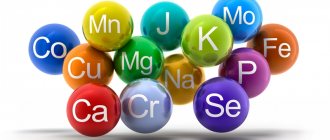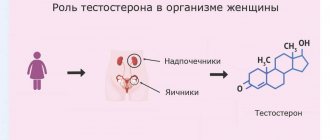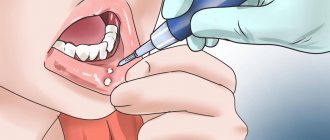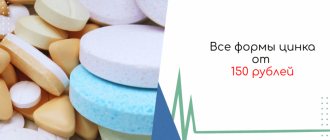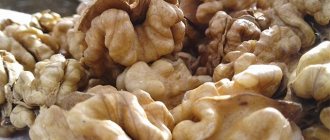The history of zinc use dates back thousands of years. Thus, the aesculapians of the ancient world, five thousand years ago, very actively used an ointment prepared on the basis of this component to treat various kinds of skin diseases and to speed up the healing process of wounds. Nevertheless, scientists became seriously interested in the properties of zinc and its role in biological processes only in the mid-twentieth century, when it was accidentally discovered that in burned rats, the wounds healed an order of magnitude faster if a small amount of this mineral was added to their daily diet.
The role of zinc in the human body and the dangers of excess zinc
Zinc is a component of more than three hundred different enzymes and hormones. It participates in all processes that support the normal functioning of the body, ensuring the development of bone tissue and brain, stimulating cell division and growth, regenerative processes, reproductive function and the immune system, etc. Thus, zinc ranks second after iron in terms of importance for the human body.
However, it should be noted that prolonged intake of zinc salts into the body causes severe intoxication and poisoning (excess zinc most often occurs due to inhalation of vapors of this element). In some cases, serious poisoning can even lead to death.
Normal absorption of zinc in the body is ensured when it is supplied in combination with vitamins A and B6. But the following substances interfere with its absorption:
- Copper;
- Tin;
- Manganese;
- Iron;
- Cadmium;
- Lead;
- Calcium (in cases where it is consumed in large doses);
- Vitamin B9 (folic acid).
Zinc, selenium and vitamin D. How to protect yourself from COVID-19?
The curve of coronavirus cases has climbed upward. But science does not stand still. The body of knowledge about the disease is growing, and new methods of treatment and prevention are appearing.
Antiviral cocktail
How to protect yourself from COVID-19 until the vaccine becomes available to everyone? And what about those for whom this vaccine is contraindicated for one reason or another?
Many doctors believe that good antiviral protection is provided by a cocktail of three components - zinc, selenium and vitamin D.
“The role of microelements in the functioning of the immune system and protection against viruses is great, and we decided to see what their significance is in the severity of COVID-19,” says Andrei Svistunov, Doctor of Medical Sciences, Professor, First Vice-Rector of Sechenov University. – Since we have a database of several hundred patients with this infection treated in our clinic, we checked the concentrations of many trace elements in their blood serum. A clear relationship was revealed - the lower the level of zinc and selenium, the more severe the disease. And vice versa – with normal levels of these microelements, there was more often a mild course of COVID-19.”
“The role of zinc in this study was expected, but such large-scale data on the important role of selenium in protection against COVID-19 have been obtained for the first time,” says Anatoly Skalny, Doctor of Medical Sciences, Professor, Head of the Laboratory of Molecular Dietetics at Sechenov University and the ideologist of this study. – The direct antiviral effect of zinc, including against coronavirus, has been well studied. It inhibits its reproduction (replication) in the cell. Plus, zinc strengthens the immune system, affecting many parts of the immune system. Vitamin D has the same effect. Additional intake of this vitamin to prevent coronavirus infection is prescribed in many official recommendations. Selenium can also affect immunity, including innate immunity, which plays a big role in COVID-19. In addition, it protects the lungs and, together with zinc, is important in reducing the inflammatory response. We know well what negative role excessive inflammation plays during coronavirus infection: the cytokine storm is the most important factor in its severe course. And perhaps selenium plays a significant role in its weakening.
Having reviewed these facts with a large international group of scientists, we came to the conclusion that zinc, selenium and vitamin D are optimal for both the prevention of COVID-19 and its treatment from the very beginning of the disease. After all, all these components are important for the production of antibodies and good functioning of the immune system. We wrote an article about this, published in the influential scientific journal Nutrients, and now together with leading scientists, including Nobel laureate Konstantin Novoselov, we are preparing a book on the role of microelements in COVID-19. It will be released in the USA and will be available to all doctors.”
How to enable “triple protection”?
“Unfortunately, residents of most of Russia lack each of these three substances,” says Anatoly Skalny. – For example, 30–40% of Russians have a zinc deficiency. Among older people with diabetes, obesity, frequent colds and chronic diseases of the lungs, liver or alcohol abuse, zinc and selenium deficiency is observed in 60–80%. Given this situation, drugs can be taken without testing their content in the body. But this can be done for no longer than 3 months and in moderate doses. For zinc this is 5–10 mg per day, for selenium – 50 mcg, for vitamin D – daily intake of 600–800 IU (15–20 mcg). In any case, this will strengthen the immune system.
But it is better, of course, to do an analysis and check the content of the components of the “triple cocktail” in the body. All of them can be determined in the blood, and zinc and selenium can also be determined in the hair. If there is a serious deficiency, the intake will take longer and the dose will need to be higher. For zinc this is 80 mg per day, for selenium - 100–200 mcg. If a person is infected with coronavirus, then such doses can be taken for 3 weeks - this will help in treatment. Don't forget to eat right with enough food rich in these substances. Note that many foods are both high in zinc and selenium, and eggs are rich in all three.
Link to publication: Arguments and facts
What are the dangers of insufficient zinc intake in the body?
Zinc deficiency can be caused by excessive intake of salts and esters of phosphoric acids (phosphates), taking oral contraceptives, diuretics, immunosuppressive medications, as well as abuse of alcoholic beverages.
The most characteristic symptom reflecting zinc deficiency is growth retardation. Other manifestations include: distortion of taste perception, disruption of metabolic processes, decreased protective properties of the body, development of complications of other diseases (for example, cirrhosis of the liver or disorders affecting the cardiovascular system), impaired sexual function, delayed puberty.
Internal changes are also complemented by external symptoms: hair loss, loss of appetite, development of dermatitis, night blindness.
Zinc deficiency
Causes of zinc deficiency
- insufficient dietary intake
- malabsorption (including vegetarianism)
- increased need during pregnancy, breastfeeding, etc.
- chronic diseases of the liver, kidneys and gastrointestinal tract
- sickle cell anemia
- diabetes
- malignant tumors
- postoperative period, burns
- alcoholism
- taking medications (estrogens, corticosteroids, diuretics, etc.)
- excess intake of copper, lead, cadmium, mercury
- helminthic infestations
Consequences of zinc deficiency
- increased fatigue, irritability, memory and sleep disturbances, hyperactivity, depression
- stunting
- dyspeptic disorders (diarrhea), loss of appetite
- impotence and delayed puberty
- slow hair growth, dandruff, alopecia
- damage to the eyes (decreased visual acuity) and skin (rashes)
- decreased immunity
- carbohydrate metabolism disorder
- reproductive dysfunction, teratogenic effect
- anemia
- loss of taste, smell
- weight loss
- slow wound healing
- peeling of nails, appearance of white spots on them
- the risk of developing diabetes increases
- BPH
- premature birth, birth of weakened children, sterility in women
- allergic reactions
- increased risk of developing tumor diseases
- early aging
- accumulation of iron, copper, cadmium, lead
Excess zinc in the body: causes
Along with deficiency, excess zinc in the body poses an equally serious threat to health.
Normally, every day the body of an adult man should receive 11 mg of zinc from food, the body of an adult woman should receive 8 mg. To meet the daily requirement for this element, nutritionists recommend eating pumpkin and sunflower seeds, oysters, sesame seeds, meat (especially beef and lamb), beef liver, legumes, oysters, etc. It is noted that even the most unbalanced diet cannot provoke an excess of zinc.
But the reasons due to which the normal concentration of zinc is exceeded include:
- Uncontrolled use of certain medications (including excess zinc caused by excessive use of ointments in which it is present as one of the main components);
- Eating products sold in packaging that contains substances as components that provoke the formation of highly toxic zinc compounds (for example, sulfates, chlorides, oxides);
- Taking zinc-containing dietary supplements - dietary supplements (it is noted that excess zinc in the body is caused by consuming more than 150 mg of this element per day);
- Eating food that has been stored in zinc or galvanized containers;
- Direct contact with zinc compounds (for example, in production conditions);
- Violation of zinc metabolism in the body.
Where to get zinc?
Zinc is found in common foods: meat, poultry, hard cheese, cereals, beans, chickpeas, peas. The highest zinc content is in shrimp. However, it is quite difficult to quickly compensate for the lack of zinc and obtain its daily requirement (15 mg) from food. The fact is that zinc is absorbed very poorly from plant products, and from animal products the human body absorbs only 20–40% of the zinc they contain.
Therefore, if a man has a zinc deficiency, then the optimal solution is to take vitamins with zinc for men. For example, the complex for increasing male fertility Speroton (more information about the product can be found here) contains zinc in the amount of 21 mg (140%), which allows both to eliminate the deficiency of this substance and to fully provide the body with this important microelement.
THIS IS NOT AN ADVERTISING. THE MATERIAL WAS PREPARED WITH THE PARTICIPATION OF EXPERTS.
Symptoms of excess zinc
Excessive intake of microelements into the body provokes the development of acute intoxication. As a rule, the symptoms of excess zinc appear in a fairly short time. Characteristic symptoms of poisoning can occur after 2-3 minutes (in some cases, the time interval after receiving an excessive dose of zinc can be from two to three hours). It should also be emphasized that young children are particularly sensitive to the element, so the characteristic manifestations of poisoning in them are more pronounced compared to adults.
So, the main symptoms of excess zinc include:
- Dysfunction of the body's immune system, which occurs as a result of hyperimmunization, and as a consequence of this, the development of autoimmune diseases (such as lupus erythematosus, rheumatoid arthritis, etc.);
- Nausea;
- Vomit;
- The appearance of a characteristic sweetish taste in the mouth;
- Intense thirst;
- Excessive stomach sensitivity;
- Impaired liver and pancreas functions;
- Decrease in the body concentration of such important elements as copper, cadmium and iron;
- Deterioration in the general condition of nails, hair and skin;
- Chills;
- Increased drowsiness;
- Pressing pain in the chest area;
- Dry cough;
- Redness of the conjunctiva and pharynx;
- Prostate dysfunction in men;
- A sharp increase in body temperature to 38-40 degrees (as a manifestation of excess zinc is observed approximately 2-3 hours after poisoning with its vapors and usually after a few hours it drops just as sharply, accompanied by profuse sweating).
Particularly severe cases are accompanied by fibrous degeneration of the pancreas, increased blood glucose levels above normal, pneumonia and pulmonary edema. In cases where zinc enters the body through the oral cavity, the patient also experiences a burn to its mucous membrane and the mucous membrane of the digestive tract. In this case, persistent vomiting with impurities of blood, cramps of the calf muscles, and characteristic manifestations of renal failure are also noted. Collapse may develop.
Excess zinc, which is observed over a long period of time, is a prerequisite for the development of cancer of internal organs. In addition, its high toxicity has a negative impact on the function of the heart, circulatory system and liver.
The body of people who have a chronic excess of zinc is unable to absorb copper, cadmium and iron from food in sufficient quantities, as a result of which its mineralization is impaired. This leads to slower bone growth, weakened tendon reflexes, and increased general weakness.
Biological role of zinc
- is a component of many enzymes in the body (more than 300 are known)
- affects cell growth, especially during their reproduction and differentiation
- participates in nucleic acid metabolism, transcription
- participates in protein metabolism
- participates in vitamin A metabolism
- maintains the concentration of vitamin E in the blood, incl. facilitating its absorption
- participates in the binding of certain hormones to the corresponding receptors
- supports reproductive function
- participates in hematopoiesis
- participates in the processes of skin regeneration, secretion of sebaceous glands
- participates in the growth of nails and hair
- improves immunity
- reduces the effect of toxic substances
- participates in the functioning of taste and olfactory receptors
